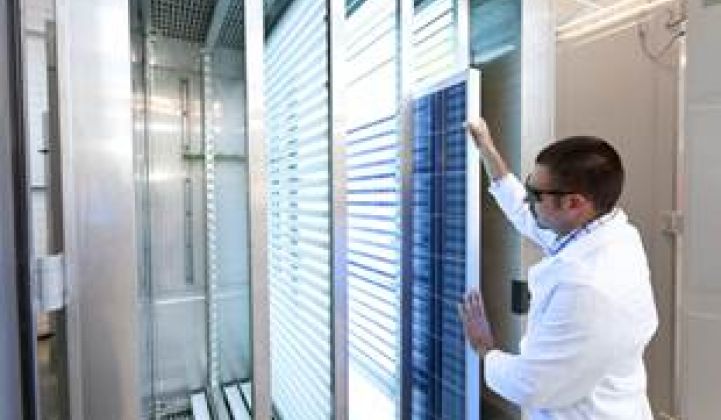Faced with perceived risk in the rapidly expanding solar industry, investors have become increasingly sensitive to accelerated performance and reliability lab test information.
PV Evolution Labs’ (PVEL) new Vendor Qualification Program is aimed at de-risking the process of module buying for solar investors.
“Module manufacturers are frustrated,” said PVEL CEO Jenya Meydbray. “To provide the required performance and reliability diligence data, they have to jump through a different set of hoops for every buyer. It’s incredibly inefficient and expensive.”
The PVEL Vendor Qualification Program is a single comprehensive protocol of extended performance and reliability tests. It was created so manufacturers could be sure they’re meeting investor and project developer standards, while also preventing investors’ diligence processes from impeding growth of the solar industry.
Through the program, Meydbray explained, the overall cost of doing business should decrease as repeated testing is replaced with a single, universally accepted set of tests.
“Third-party assessment of performance is like the EPA’s certification of vehicles’ miles-per-gallon [rating]. It is commonplace in other industries,” Meydbray said. “Acceptance of this program is evidence the solar industry is maturing.”
Performance is covered by PAN files, IAM coefficients, and LID testing, according to Meydbray. Extended thermal cycling, damp heat, humidity freeze, UV, dynamic mechanical load, and PID testing are included in the reliability portion.
PVEL’s program now has seventeen buy-side members, including Phoenix Solar, E.ON Climate & Renewables, SPG Solar, Capital Dynamics, juwi, Clean Power Finance, Lincoln Renewable Energy, K-Road, Panasonic Eco Solutions North America, AM Solar Corp and Blue Oak Energy.
There are eight enrolled manufacturers, including JA Solar, JinkoSolar, BYD, and Astronergy. Three others are pending, Meydbray said. There is no fee for membership; instead, manufacturers pay for the testing.
“To get traction in the marketplace and make the program as far-reaching as possible, there is, at present, no cost to buyers. But they must sign a non-disclosure agreement to get access to the manufacturers’ test results," said Meydbray.
The achievement of SunPower's E series module in PVEL’s potential induced degradation (PID) test, a component of the vendor program’s reliability protocol, shows what the program could provide.
In 600 hours of high-temperature, high-humidity, and high-voltage conditions during PVEL’s PID test, the SunPower E20/327 module’s power output degraded by less than 0.2 percent. That was twenty times less than the 4 percent to 5 percent degradation of the six other modules that have passed PVEL’s test. Another seven modules tested by PVEL failed the assessment, with degradation levels ranging from 18 percent to 87 percent.
Modules are more prone to PID in higher-humidity locales like Florida, Massachusetts, New Jersey, Missouri and Minnesota where PV is opening new markets, as detailed by GTM Research’s U.S. Solar Market Insight report.
SunPower’s modules have been put through several other third-party validations recently. Atlas Material Testing Technology gave the modules its “unprecedented reliability” rating, which indicates a power drop of less than 2 percent during degradation tests. Fraunhofer ranked the modules first in its PV Durability Initiative and gave them scores of perfect fives in all ten test categories. And they were the first, second and third highest-performing modules among the 151 ranked in the Photon 2012 Module Yield Test.
“This is really about risk,” said Zach Campeau, product manager for SunPower's Modules Group. “The solar industry is still relatively new and faces the challenge of giving investors the information they need to quantify risk. We need to be able to demonstrate we have a low-risk product because that will lower the cost of capital and make solar more affordable.”
SunPower is a unique case because it must prove its higher efficiency, yield and reliability are worth the module's higher per-watt cost. But with the new PVEL Vendor Qualification Program, SunPower might have reduced its potential buyers’ perceived risk without the cost and time needed for repeated testing.
“This single Vendor Qualification Program, if accepted by a large number of major buyers and investors, improves the efficiency and overall spend for manufacturers because they only have to jump through one hoop for many buyers,” Meydbray said.



